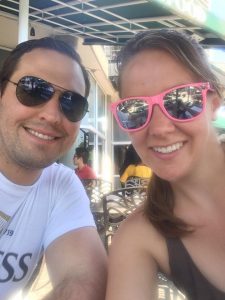Denis O’Brien [0:37]
Welcome to Episode 184. Saving joyfully. Hey Money Clan! A very warm welcome to the Chain of Wealth podcast. I’m your host, Denis O’Brien.
Katie Welsh [0:49]
And I’m Katie Welsh.
Denis O’Brien [0:50]
Katie, really epic conversation we had with Andrea, and a really interesting story about how she funded her college tuition.
Katie Welsh [0:58]
Yeah, I love talking to her. I love hearing people who are still in the fight. And I remember when I was paying off my debt, how I would feel and I remember talking to people, and they’re like, I love that you are so active in your debt payoff. And she really a lot of things she said, I was like, I definitely remember this. And I remember how it feels. And I just felt so inspired by her because she started with so much and she is still fighting away every day.
Denis O’Brien [1:29]
Yeah, the biggest takeaway for me was, it doesn’t make a difference where you are in your journey, you can always improve on where you’re at. And you can always make things a little bit better for yourself. Yeah, so yeah, she may not be debt free, and she’s in her late 30s. However, that doesn’t mean that she’s given up. In fact, she’s like, double down, and she’s trying to get them even more serious now. And I think that if you can do that, you’ll do really well.
Katie Welsh [1:52]
Well, and I think that is such an admirable quality because so many people don’t. And she is really proactive, and I found talking to her. So inspirational.
Denis O’Brien [2:2]
Awesome. Well, before we dive right in, if you guys haven’t already, we’d love if you joined our Facebook community, head on over to change evolve.com slash grip. We have an awesome close knit community. We’d love if you would come and join us and tell us your money story. Alright, Kate’s you ready to dive right in? Yeah, fantastic. Let’s start. Welcome to chain of wealth. here’s your host, Dennis inspiring you to begin your journey of financial freedom. Today, we have Andrea joy from saving joyfully.com. Andrea is a personal finance blogger who after making some bad financial choices in college has turned her finances around and now helps others to do the same. Her blog began as a way to share some great ways to help stretch her budget and documents her journey to achieve financial freedom. Andrea is 37 years old and has been married to the love of her life, Jason for the last 12 years. Together, they have been working on building up budgets and creating a more balanced life. Welcome.
Andrea Joy [3:6]
Hi, how are you guys?
Katie Welsh [3:8]
Good things thanks, how are you?
Andrea Joy [3:10]
Pretty good.
Katie Welsh [3:12]
So I am a little bit intrigued. I wanted to chat about some of your bad financial choices that Dennis alluded to in the beginning. Okay, just because I think we have all made them. And I’m always curious as to what other people did.
Andrea Joy [3:28]
So sounds good. And I’m pretty much an open book on most of those things. Because I know where I came from, and I don’t want others to make those mistakes.
Katie Welsh [3:37]
Yeah. So what were some of like the things that you did back in college, and when you were a bit younger, that kind of set you back a bit, you feel like,
Andrea Joy [3:48]
well, I came from kind of a tough situation growing up, my parents were not good with money. They did not teach us much about handling money. And I was one of nine children. So when it came to going to college, I was on my own as far as finances, but that. So because of not qualifying for student loans, because of my parents financial situation, I had to find another way. And at that point, credit card offers were coming in from a lot of different companies, which I think tends to happen for a lot of college students. And I applied for my first credit card. And a that point, that is how I started paying my tuition, and my books. So all of that went on credit cards, I did work, but I worked full time and lived on my own. And between the amount that I was making at that time, and paying for school, I didn’t have enough money to fund it. So it all went on credit cards at that point.
Denis O’Brien [4:57]
So essentially, you were in a position where you would still trying to work and you know, trying to peddle but just because of the sheer cost of college. And obviously the amount of hours required every month, you were essentially going a little bit more negative.
Andrea Joy [5:11]
Yes. And at that point, although it was a horrible decision, it seemed like the best one.
Katie Welsh [5:19]
But I can’t imagine being in that situation. Because I know, when I think back to my, how I was at 17 and 18. and applying for college, I was pretty worse. And my mom was like, This is what you’re going to do. And she kind of, you know, just told me what to do. And I did it. And it doesn’t sound like you have that same kind of guidance, you
Andrea Joy [5:41]
know, and that definitely would have been helpful to have somebody who knew what to do and who would have guided me. But I felt pretty alone during that period of time. And I did what I thought was the best thing for myself, I always wanted a better education. So when I decided to go back to college, I didn’t even really know what I wanted to go for. And I’m sure that is very common with a lot of college students, too. I switched majors a couple of times while I was in college, finally ended up settling on business management, which is what I graduated with.
Katie Welsh [6:21]
Well, I think you should definitely tip your hat to yourself for just going because I think a lot of people who are just coming coming out of high school, kind of need that push to go. So the fact that you didn’t have anybody to help you. And then I didn’t even know that you could not qualify for student loan. Yeah, I thought they
Andrea Joy [6:41]
basically would take anybody. I graduated in 1999. And at that point, and I’m not sure if it’s still the same, but up until the age of 26 they still count your parents income. Uh huh. So if your parents don’t sign for alone, you cannot get one. So that’s how it was for me.
Katie Welsh [7:1]
I do remember people talking about that.
Andrea Joy [7:3]
Yeah, so that was the tough part. So I didn’t qualify at that time, up until the point that I was 26, I was not able to qualify, which I wish I wouldn’t have had to do student loans either, which I did have to eventually to. But, you know, it is what it is. And I’ve learned a lot of lessons. And I’m making great strides and getting myself out of the debt that I put myself in.
Denis O’Brien [7:58]
Fantastic. So in terms of these credit cards, so you basically use seven credit cards, and you just basically maxed them all out essentially paying for your college tuition. Once you got out of college, what was your sort of thought process then? Because obviously, you start looking at your credit cards, you’re like, wow, you know, the average APR on this is like, whatever it is probably like 25%, which is pretty expensive. Yeah. Did you still try and restructure them in some way? Or what is your thought process?
Andrea Joy [7:58]
Well, honestly, survival was at that point I was at at that time, it was just tough. It was trying to keep up with even the minimum payments for those was so hard. I worked so much over time, I actually met my husband around that same time, I was still in college at that time. And we got ended up getting married in 2006. But at that time, I was not focused on paying them down, I was focused on surviving and making it through, we did very well with our wedding like keeping it, I think it was under 2000 for the cost of our wedding. And then I think it was close to the same for our honeymoon. So in comparison to a lot of people, we did pretty well, I’ve always been really frugal, except for those situations where I was desperate. So I learned a lot of that from my grandmother growing up, because my grandmother was always into saving money and getting the best deals and stuff. So I learned a lot of that from her. But my main focus when I got out of college, was just to make those payments. And then as the years went on, I started to realize that I wasn’t making the strides that I wanted to make with it started getting more serious about it at that point.
Denis O’Brien [10:3]
So I read an article on your websites, and it says you managed to pay off seven credit cards that you were using during college. And you essentially haven’t used them since they actually the last one would have been number seven is that I just paid off.
Andrea Joy [9:54]
Thank you. And that was very exciting. It’s It’s always a good feeling when you’ve paid off any of those debts.
Denis O’Brien [10:1]
Yeah, definitely.
Katie Welsh [10:3]
So where are you at today in your journey? Like, you’ve obviously come very far. Yeah. Where are you now?
Andrea Joy [10:11]
Currently, I’m in a better place. I like I said, I’d still paying on student loans. And I still have, I actually have four cards that I’m still working on at this point. Sounds like a lot It was. It was a lot of debt that has built up over the years. But like I said, I’ve come a long way. My focus right now like each time I pay off a credit card is to put that amount that I was paying on to that other credit card on to the next credit card, I’ve actually been able to pay more on to those cards than even that. Recently, my job has gotten a lot better. I’ve improved my own financial situation a lot more over the years. So things are getting a little bit less tight.
Katie Welsh [11:2]
Yeah, well, with every pay off that comes, you have more money to put towards your other deck. So thankfully, each payment gets a little bit easier. And yeah, I remember when I was paying off my loans. That was what I had to focus on and remind myself that each payment is like a big chunk out of it. And it will get easier and easier as it goes. Did you finally pay yourself completely fine.
Andrea Joy [11:29]
Yes, I I put my head in the sand and, and the big thing that I had was my student loan and I had really bad car loan that I was paying through the roof for for a Honda. And I eventually just, you know, decided it was time to deal with it. And I just stuck to it. But it was brutal. There were times where I just wanted to quit. And I’m sure you feel the same way. Yeah. And even with having a couple more credit cards left and your student loan, if you look at the grand scheme of things, you have come so far already, that there’s there’s no turning back.
And that’s what I want others to see, especially when they come to my website is just some encouragement and knowing that you may be in a place like this. But there is hope. Because there are many times that I have felt the complete opposite. It is a struggle. It’s it’s horrible struggle when you’re that deep and debt. But it is possible. If I’ve done it, someone else can do it.
Denis O’Brien [12:35]
So did you ever consider declaring bankruptcy, this will try and get rid of a lot of the credit cards? I’m not sure if that would work because they essentially funded your college tuition. Yeah, but just out of curiosity,
Andrea Joy [12:47]
I’m in the past, I considered it. But that’s not what I want to do. I feel like I am responsible for my debt. So I should take care of it. There are a lot of people that have to and they get to that point. But I believe in hard work and doing what I can to take care of the mess that I’ve made.
Denis O’Brien [13:11]
Yeah, makes sense. So like, obviously, using these credit cards so much, I read that like, basically have like paid them off. And now you pay them off. You haven’t really used them. Yes. Are you still against using credit cards today? Like, I’m curious to hear your thoughts, because obviously a lot of people talk about credit card hacking and stop?
Andrea Joy [13:31]
Well, I have one card that I use and pay off every month. And that is it’s a you promise card that earns me cash back. Oh, cool. Yeah. And that when I actually do use, like I said and paid off every month, and I use it for specific things that I have to do every month are I’m trying to think the car insurance goes on that. And my phone bill goes on to that one. And those are bills that I’m already paying anyways. And they automatically get paid off every month. So it kind of helps. It’s just a little bit of extra money that way. But I don’t do a lot of credit card hacking, because I’m not real fond of credit cards after. So once I am done paying them off, I don’t want to do them like that, again,
Katie Welsh [14:26]
I completely understand and get where you’re coming from. I have a girlfriend who basically is same way when I talked to her about credit card hacking. She was like, I don’t use credit card. And like, that was the end of the conversation. I was like, Oh, okay.
Andrea Joy [14:42]
And I know it works for some people. And I’m fine with that. But I’m one of those people that it’s been a struggle for me in the past. And when you know your limits, you’re better off to avoid those things.
Katie Welsh [14:53]
Yeah, for sure. So I wanted to talk about where you are. Now, you’ve come really far and you have this great blog that focuses a lot on achieving a balanced life and motivating other people. And I wanted to know what advice you have for people who are in the struggling trying to find balance in their life?
Andrea Joy [15:16]
Well, I would say definitely don’t give up, I know there’s going to be those tough days, they’re going to be a lot of times where you’re going to feel like you just can’t do it. But you can hard work consistency, those are the biggest things, those are going to get you where you need to go. And you may have to do overtime, you may have to pick up an extra job, you may have to cut things out of your budget that you may not want to. But that’s how you’re going to get there. So those would be the things I would say,
Denis O’Brien [15:54]
The amazing thing about like just picking up an extra job is it actually makes such a big difference. It really does, you know, because like you have your set expenses every month, and whatever money you earned from a second job is literally pure bottom line for us. So you can take that money and really put it to good use. And there’s nothing really that’s going to take something from that, obviously, the government will take that ship, but that’s about it.
Katie Welsh [16:20]
Yeah. And we’re in an age now where picking up a second job is so easy. I personally have three. So Wow, I feel like all I’m doing is working and saving to try to catch up. Because it did take me such a long time to pay off my debt. That I love the fact that you say, you know, don’t give up. There are hard days, but you can do it. And you know cutting back your budget or earning more money. We’re in like that great time where you can easily earn money if you need to.
Andrea Joy [16:54]
Yeah. Katie, did you come through some of the same things with credit cards also? Or was it just your student loans?
Katie Welsh [17:1]
Um, no, not with credit cards, my story is a is a bit different. I’m not a shopper. So I never really had credit card debt. I had, I guess I would say like obliviousness that I was trying to help people and cosign for a car loan, and that kind of, and the lack of better term screwed me over in the end. And then I was pretty oblivious with my students. And, you know, with my, like, 6% interest in ignoring it for years, that also was quite painful to come to terms with. And then I did end up having a little bit of credit card debt, because I had a medical bill that I ended up just wanting to get rid of the hospital off of my back, and I put I paid the hospital bill onto my credit card. Not the brightest thing I ever did. But I completely understand that too. But that is where all my debt really was. So talking about all that stuff, I’m sure now you have a budget, and you’re pretty regular with it. Yes. What is your budget? Like? And how often do you go over it?
Andrea Joy [18:17]
Um, we’re actually really good. My husband is one of the biggest ones that manages the budget. And he is just adamant about, like, when we go to the grocery store, we stay under 18 dollars a week for the two of us. I mean, it’s tough sometimes. But we do it. We budget for everything. Aside from like, when I’m paying a little more on to a credit card or something like that. We budget everything. And so, I mean, there are times where we’ll splurge go out to eat, or we’ll go to the movies or something like that. But those are all figured into the budget also.
Denis O’Brien [18:56]
So how critical Would you say that budgeting has been to your success?
Andrea Joy [19:1]
It would not work otherwise. It just, it’s impossible to pay down the type of debt that we’ve had, or that I have had personally, if you don’t have a good budget, if you are not on top of everything that you bring in.
Denis O’Brien [19:18]
Yeah, and I think that doesn’t just work for debt, it works for building up your net worth as well. Yeah, you know, a lot of people just think, oh, you have to budget cuts you in debt. But I think it’s even just as important. If you are on the other side, and you’re trying to look long term. And I think that everyone should really have a budget and whether depending on where you are in your journey shouldn’t actually impact the states of your budget, you should always like have clear, you know, clear motors in terms of actual different categories. And you should always try and stick to them and hold yourself accountable. And I think that if you can develop that at a younger age, it will help you considerably more later laugh.
Andrea Joy [19:57]
I agree. And another bad decision that I made when I was younger was not starting a 401k until I was older. I was probably about 26 when I finally started it. So it’s taken me a while to build that up. Also, my company gives 3% match, which is great. But I didn’t take advantage of that for many years that I worked for the company. And I regret that.
Katie Welsh [20:23]
I remember hearing when I was in my first teaching job, that lot of the older teachers will the people will come around for their retirement plans and everything. And all the older teachers would lecture the younger teachers and say, I wish I would have done this. When I was your age, start your retirement plan now.
Unknown Speaker]20:16]
And you just don’t take him seriously.
Katie Welsh [20:48]
Everybody is like, yeah, whatever we’ll get to it. And thankfully, my brother is also in finance and everything. And he basically forced me because otherwise I don’t think I would have started quite as early. But I still didn’t contribute like a whole lot of money. So yeah,
Andrea Joy [21:8]
but I figure every little bit it’s better than nothing. I actually had this conversation with my 20 year old sister last week. And I was just telling her, because she’s starting at the same company that I work for. I was like, put in something they match. Trying to explain to her, you probably don’t understand what I’m saying right now. But believe me, the younger you start, the better off you’re going to be late.
Denis O’Brien [21:31]
Absolutely. Yeah. And even building up to the point that you can actually max out your 401k you know, like it’s Yeah, it’s the small steps that counts. And the younger you are that you get into that habits of icon touch this money, it’s going to long term retirement, you know, the better off you’ll be.
Andrea Joy [21:47]
Yeah, I agree.
Denis O’Brien [21:50]
Money Clan, we’re going to take a quick break and then we’ll dive right back into the value link round.
This episode is sponsored by SAVVI Financial. Why does good financial advice have to be so hard to get so complicated, so expensive? With savvy it doesn’t. Simply smart advice can be yours. at no cost. You can be the Financial Action Hero and take control of your financial future in minutes with savvy savvy helps you organize all your financial accounts, and make sense of your overall spending then gives you specific advice on your financial goals. But by a team of MIT trained data scientists savvy office will pass a financial advice on retirement, refinancing, student debt, life insurance and more. And the best part, the basic subscription is free, who doesn’t love free, or any advice you’re going to get? It’s personalized and independence. savvy puts your best interests first. You don’t have to pay human advisor thousands of dollars. Always countless hours struggling to build a plan. savvy makes it easy and fast. Go to change evolve.com slash savvy. That’s s A vv, and click on the sign up tab at the top of the screen. That’s chain evolve.com slash savvy. Take control of your financial future in minutes with the savvy.
Katie Welsh [23:24]
Okay, Andrea, so we talked a bit about it before the break. But what are your retirement and saving plans looking like?
Andrea Joy [23:32]
I have a 401k. And I have a pension actually with my company, which is the only thing that pretty much saved me from you know, not having put anything into my 401k for all those years, the pension that they gave me was great. My savings account is actually better than it has ever been, which is part of how I was able to pay off that credit card. I do what they call a 52 week money challenge every year. Something that you can find on Pinterest pretty easily. And you start with like $1 in the first week, and it builds up as you go through. And I’ve been able to do that probably for the past three years, I have used some of that money towards different things. Right now. I have just under $2,000 in my savings. Fantastic. So and that was with paying 1500 last week on to this credit card to get rid of it.
Denis O’Brien [24:30]
Good for you. It’s super exciting.
Katie Welsh [24:32]
I have fond memories of the 52 week money challenge I used to do with my mom. Yeah. And we would hold each other accountable. And then at the time, neither one of us had any willpower. So it’d be like $100, then, and then we would go and spend it. But it was always really fun to do, especially if you have somebody to do it with. Yeah,
Andrea Joy [24:54]
it’s the only way that I’ve been able to, I guess trick myself into saving money. But it works. And it’s it’s amazing how you can start from such a small amount and build up to that much over the years time.
Katie Welsh [25:8]
Yeah.
Denis O’Brien [25:9]
Cool. So do you have a favorite book that you can’t answer?
Andrea Joy [25:12]
Well, my favorite finance book is The Millionaire Next Door. And I read that actually in college. It opened my eyes a bit to what finance really was. And some great ways to look at things, I guess, like the part in the book where they talk about how you can make what a physician makes, or a surgeon every year and still spend every bit of it and not be wealthy. And that opened my eyes greatly because it’s not even so much how much money you’re bringing in. It’s how you’re managing it.
Katie Welsh [25:55]
Definitely. And that was eye opening to me too, as well. So do you have a favorite quote that you tried to live by?
Andrea Joy [26:3]
I’m not exactly I guess my favorite quote was by Emily Dickinson. It’s, if I can stop one heart from breaking, I shall not live in vain. And that quote to me, just kind of sums up how I like to look at others to try to make a difference in other people’s lives.
Denis O’Brien [26:27]
That’s lovely. Andre, wherever 50 left hanging out today. Do you have another last parting piece of advice for our listeners? And then we’ll say goodbye.
Andrea Joy [26:35]
Just don’t give up. Just keep plugging away at your debt if you have it. And definitely start saving today.
Denis O’Brien [26:45]
Money Clan we’re be hanging out with Andrea Joy, you can check out her website. It’s saving joyfully.com and definitely stop making those incremental changes. They’re going to have a massive impact to you in later life.








